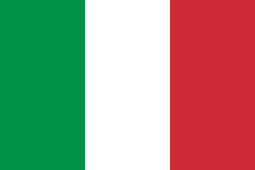Italian flag
 |
|
| Name | Tricolore |
|---|---|
| Use | National flag |
| Proportion | 2:3 |
| Adopted | 18 June 1946 |
| Design | A vertical tricolour of green, white and red |

Variant flag of the Italian Republic
|
|
| Use | Civil ensign |
| Proportion | 2:3 |
| Adopted | 9 November 1948 |
| Design | A defaced Italian tricolour |

Variant flag of the Italian Republic
|
|
| Use | State ensign |
| Proportion | 2:3 |
| Adopted | 24 October 2003 |
| Design | A defaced Italian tricolour |

Variant flag of the Italian Republic
|
|
| Use | Naval ensign |
| Proportion | 2:3 |
| Adopted | 9 November 1947 |
| Design | A defaced Italian tricolour |
 |
|
| Use | Civil flag and ensign |
|---|---|
| Proportion | 2:3 |
| Adopted | 1861 (Sardinia 1851) |
| Design | A vertical tricolour of green, white, and red, defaced with the arms of Savoy |

Variant flag of the Kingdom of Italy
|
|
| Use | State flag, state and naval ensign |
| Proportion | 2:3 |
| Adopted | 1861 (Sardinia 1851) |
| Design | A defaced Italian tricolour with crown |

Variant flag of the Kingdom of Italy
|
|
| Use | War flag |
| Proportion | 1:1 |
| Adopted | 1861 (Sardinia 1848) |
| Design | A defaced Italian tricolour |
 |
|
| Use | Civil flag and ensign |
|---|---|
| Proportion | 2:3 |
| Adopted | 1943 |
| Design | A vertical tricolour of green, white, and red. |

Variant flag of the Italian Social Republic
|
|
| Use | War flag |
| Proportion | 2:3 |
| Adopted | 1944 |
| Design | A vertical tricolour of green, white, and red, charged with a silver hawk clutching horizontally placed fasci littori. |
The flag of Italy (bandiera d'Italia, often referred to in Italian as il Tricolore [il trikoˈloːre]) is a tricolour featuring three equally sized vertical pales of green, white and red, with the green at the hoist side. Its current form has been in use since 18 June 1946 and was formally adopted on 1 January 1948.
The first entity to use the Italian tricolour was the Cisalpine Republic in 1797, which supplanted Milan after Napoleon's victorious army crossed Italy in 1796. The colours chosen by the Cispadane Republic were red and white, which were the colours of the recently conquered flag of Milan; and green, which was the colour of the uniform of the Milanese civic guard. During this time, many small French-proxy republics of Jacobin inspiration supplanted the ancient absolute Italian states and almost all, with variants of colour, used flags characterised by three bands of equal size, clearly inspired by the French model of 1790.
Some have attributed particular values to the colours, and a common interpretation is that the green represents the country's plains and the hills; white, the snow-capped Alps; and red, blood spilt in the Wars of Italian Independence. A more religious interpretation is that the green represents hope, the white represents faith, and the red represents charity; this references the three theological virtues.
The tricolour was reportedly used for the first time on November 13–14. 1794 on a cockade worn by a group of students of the University of Bologna, led by Luigi Zamboni and Giovanni Battista De Rolandis, who attempted to plot a popular riot to topple the Catholic government of Bologna, a city which was part of the Papal States at the time. The law students defined themselves as "patriots" and wore tricolour cockades to signal they were insipred by Jacobin revolutionary ideals, but modified them to distinguish themselves from the French. The chosen colours were white and red since those are the colours of the flag of Bologna, some scholars contend green was added only for the event to give it a more idelogical effect; not all agree that the cockades used by the Bologna plotters actually had three colours, since a myth about that may have been created a year later. On May 18. 1796 a cockade with those colours commemorating the Bologna riots was reportedly presented to Napoleone Bonaparte in Milan, who decided banners with same colours would be carried by the Milan Civic Guard, of the Lombard Legion and the National Guard.
...
Wikipedia
